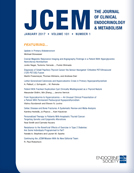-
Views
-
Cite
Cite
W R Phipps, M C Martini, J W Lampe, J L Slavin, M S Kurzer, Effect of flax seed ingestion on the menstrual cycle, The Journal of Clinical Endocrinology & Metabolism, Volume 77, Issue 5, 1 November 1993, Pages 1215–1219, https://doi.org/10.1210/jcem.77.5.8077314
Close - Share Icon Share
Abstract
Lignans are a group of phytochemicals shown to have weakly estrogenic and antiestrogenic properties. Two specific lignans, enterodiol and enterolactone, are absorbed after formation in the intestinal tract from plant precursors particularly abundant in fiber-rich food and are excreted in the urine. We evaluated the effect of the ingestion of flax seed powder, known to produce high concentrations of urinary lignans, on the menstrual cycle in 18 normally cycling women, using a balanced randomized cross-over design. Each subject consumed her usual omnivorous, low fiber (control) diet for 3 cycles and her usual diet supplemented with flax seed for another 3 cycles. The second and third flax cycles were compared to the second and third control cycles. Three anovulatory cycles occurred during the 36 control cycles, compared to none during the 36 flax seed cycles. Compared to the ovulatory control cycles, the ovulatory flax cycles were consistently associated with longer luteal phase (LP) lengths (mean +/- SEM, 12.6 +/- 0.4 vs. 11.4 +/- 0.4 days; P = 0.002). There were no significant differences between flax and control cycles for concentrations of either estradiol or estrone during the early follicular phase, midfollicular phase, or LP. Although flax seed ingestion had no significant effect on LP progesterone concentrations, the LP progesterone/estradiol ratios were significantly higher during the flax cycles. Midfollicular phase testosterone concentrations were slightly higher during flax cycles. Flax seed ingestion had no effect on early follicular phase concentrations of DHEA-S, PRL, or sex hormone-binding globulin. Our data suggest a significant specific role for lignans in the relationship between diet and sex steroid action, and possibly between diet and the risk of breast and other hormonally dependent cancers.





